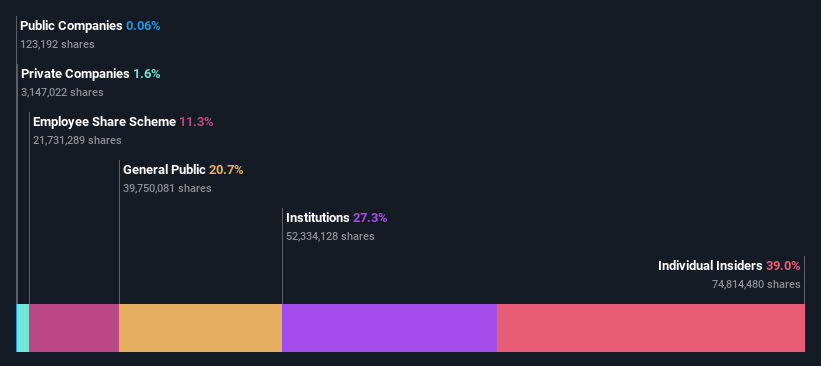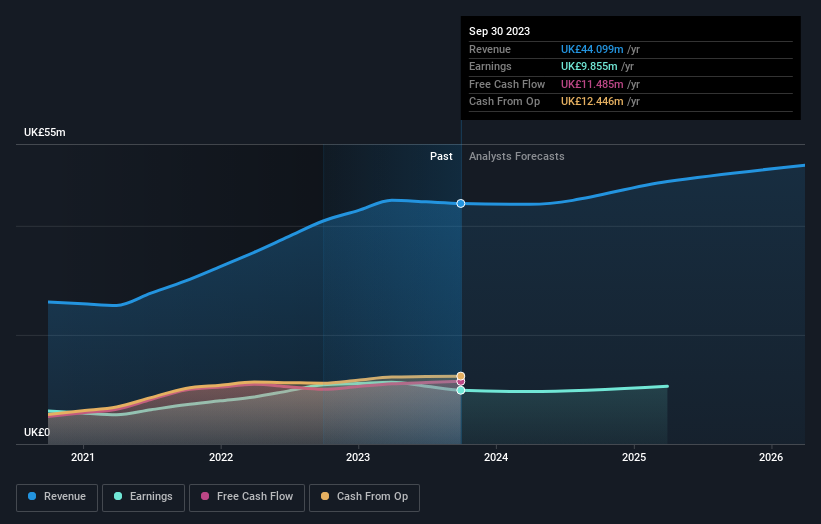Despite recent sales, Record plc (LON:REC) insiders still hold the largest share with a 39% interest
Key Insights
Insiders appear to have a vested interest in Record's growth, as seen by their sizeable ownership
The top 4 shareholders own 53% of the company
Insiders have sold recently
To get a sense of who is truly in control of Record plc (LON:REC), it is important to understand the ownership structure of the business. The group holding the most number of shares in the company, around 39% to be precise, is individual insiders. Put another way, the group faces the maximum upside potential (or downside risk).
Despite selling some shares recently, insiders control a good portion of the company's stock.
In the chart below, we zoom in on the different ownership groups of Record.
See our latest analysis for Record

What Does The Institutional Ownership Tell Us About Record?
Many institutions measure their performance against an index that approximates the local market. So they usually pay more attention to companies that are included in major indices.
Record already has institutions on the share registry. Indeed, they own a respectable stake in the company. This implies the analysts working for those institutions have looked at the stock and they like it. But just like anyone else, they could be wrong. If multiple institutions change their view on a stock at the same time, you could see the share price drop fast. It's therefore worth looking at Record's earnings history below. Of course, the future is what really matters.

Hedge funds don't have many shares in Record. The company's largest shareholder is Neil Record, with ownership of 28%. Record Plc, ESOP is the second largest shareholder owning 11% of common stock, and Leslie Meier holds about 8.3% of the company stock. Leslie Meier, who is the third-largest shareholder, also happens to hold the title of Member of the Board of Directors.
To make our study more interesting, we found that the top 4 shareholders control more than half of the company which implies that this group has considerable sway over the company's decision-making.
While studying institutional ownership for a company can add value to your research, it is also a good practice to research analyst recommendations to get a deeper understand of a stock's expected performance. There is some analyst coverage of the stock, but it could still become more well known, with time.
Insider Ownership Of Record
While the precise definition of an insider can be subjective, almost everyone considers board members to be insiders. Company management run the business, but the CEO will answer to the board, even if he or she is a member of it.
I generally consider insider ownership to be a good thing. However, on some occasions it makes it more difficult for other shareholders to hold the board accountable for decisions.
Our most recent data indicates that insiders own a reasonable proportion of Record plc. Insiders own UK£53m worth of shares in the UK£136m company. This may suggest that the founders still own a lot of shares. You can click here to see if they have been buying or selling.
General Public Ownership
The general public, who are usually individual investors, hold a 21% stake in Record. This size of ownership, while considerable, may not be enough to change company policy if the decision is not in sync with other large shareholders.
Next Steps:
I find it very interesting to look at who exactly owns a company. But to truly gain insight, we need to consider other information, too. Case in point: We've spotted 1 warning sign for Record you should be aware of.
If you would prefer discover what analysts are predicting in terms of future growth, do not miss this free report on analyst forecasts.
NB: Figures in this article are calculated using data from the last twelve months, which refer to the 12-month period ending on the last date of the month the financial statement is dated. This may not be consistent with full year annual report figures.
Have feedback on this article? Concerned about the content? Get in touch with us directly. Alternatively, email editorial-team (at) simplywallst.com.
This article by Simply Wall St is general in nature. We provide commentary based on historical data and analyst forecasts only using an unbiased methodology and our articles are not intended to be financial advice. It does not constitute a recommendation to buy or sell any stock, and does not take account of your objectives, or your financial situation. We aim to bring you long-term focused analysis driven by fundamental data. Note that our analysis may not factor in the latest price-sensitive company announcements or qualitative material. Simply Wall St has no position in any stocks mentioned.
